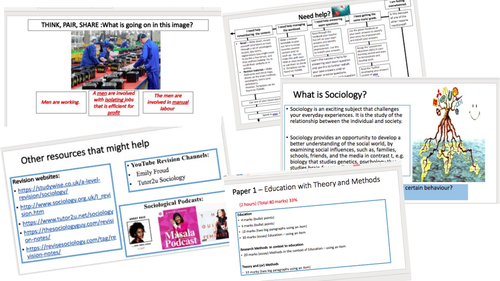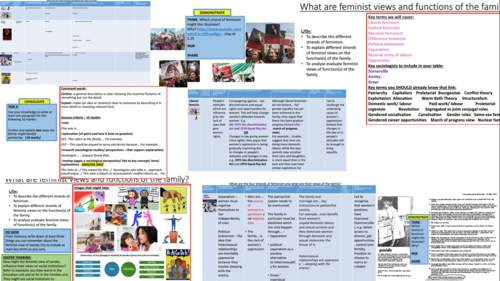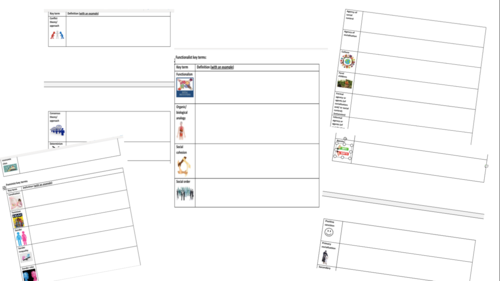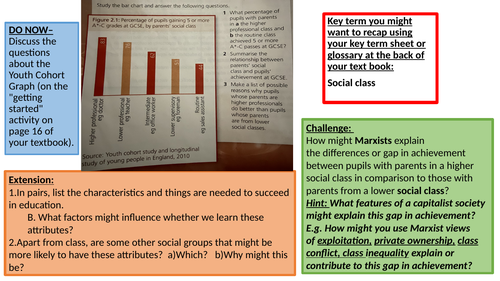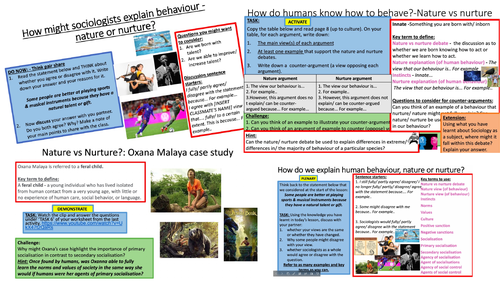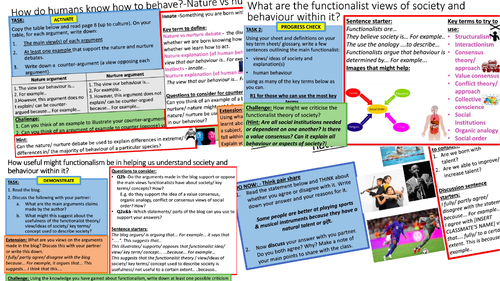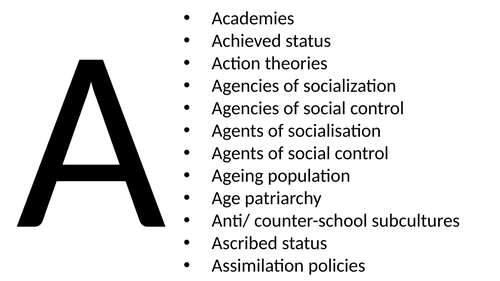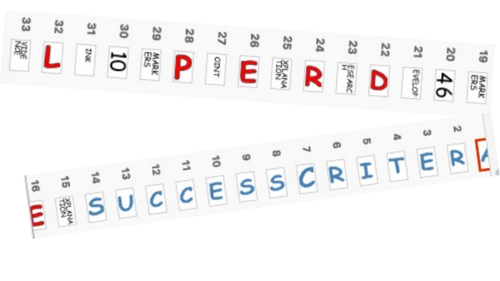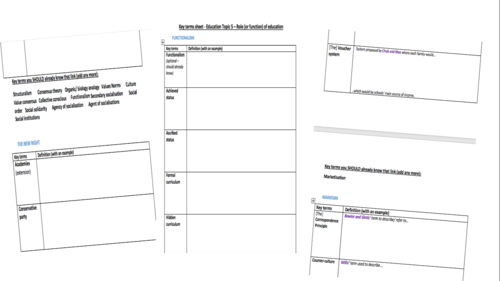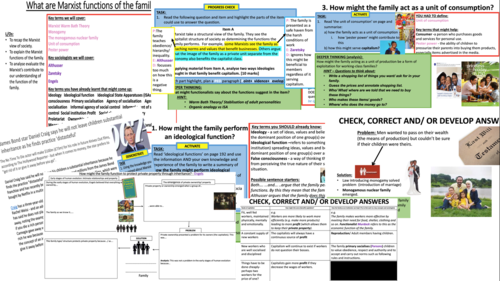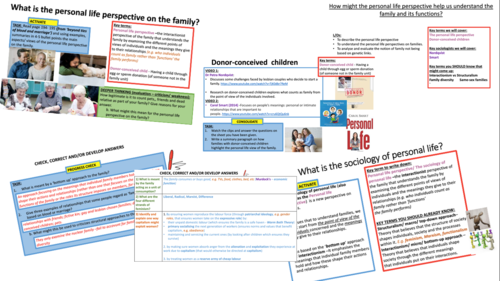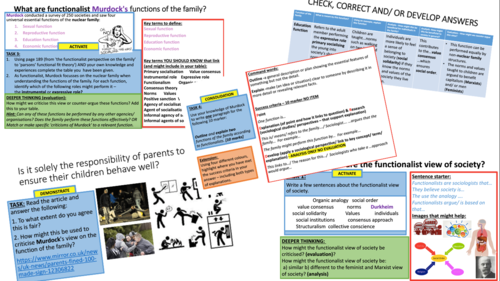
154Uploads
20k+Views
4k+Downloads
Sociology

Introduction to Sociology lesson
This is a lesson I use as an introduction to the AQA A-level Sociology course and to the sociological imagination or line of inquiry. The lesson includes:
an overview of the course, exam and curriculum
activities to introduce students to Sociology and sociological thinking/ inquiry.
suggested reading, podcasts, revision websites youtube channels that students can use to develop their knowledge and understanding of key ideas and concepts.
Expectations
Can be easily edited to meet your needs, e.g. specification, expectations and can also be used as an introduction to AQA GCSE Sociology .
Bundle

A-LEVEL SOCIOLOGY INTRO LESSONS - nature vs nurture, functionalism, marxism, feminism, QUIZ & ANSWERS
Detailed and differentiated (up and down) student-led lessons that help students to develop their knowledge and understanding from previous lesson(s). L2 uses page 8 from AQA Book 1 by townsend but CAN BE USED FOR ANY SPEC using resources within lesson (see below). Comes with key term sheet for the lesson.
1. Introduction to Sociology - provides an overview of Sociology course (spec to AQA A-level but can easily be edited to suit ANY SPEC and GCSE) and the sociological imagination.
2. How do sociologists explain behaviour? -Nature vs Nurture lesson -explores the nature vs debate, norms, values, socialisation (primary/secondary) and social control as an introduction to Sociology. Uses page 8 of the AQA A-level Book 1 by Townsend to introduces students to the nature vs nurture debate but this can be replaced and the rest of the lesson can still be used.
3. Introduction to functionalism -explores value consensus, social order, biological/ organic analogy, structuralism, consensus theories to introduce students to the key functionalist views and ideas.
4. Introduction to Marxism -explores capitalism, ownership, interests, structuralism, conflict theories, exploitation as a way to introduce students to the main Marxist views and ideas.
5. Introduction to feminism - explores sex, gender, gender roles, patriarchy, socialisation, gender inequality as a way to introduce students to the main feminist views of society and ideas.
6. Quiz lesson - small revision activity
25 min quiz (on nature vs nurture, key functionalist, Marxist, feminist’s ideas and terminology) —LESSONS CAN BE FOUND ON MAIN PAGE. Includes:
answers/ mark-scheme
scaffolding for students to peer assess (but quiz can also be marked by teacher)
Made for AQA but can be used for ANY SPEC
Can be differentiated down for GCSE, but I recommend purchasing the GCSE Intro lessons bundle which have alread been edited to meet the needs of KS4 students.

AQA A-level Sociology Families: Theories of the family – Feminist views of the family (UPDATED))
Detailed and differentiated (up and down) student-led lesson that examines and evaluates Liberal (Somerville), Radical (Greer), Marxist (Ansley) and Difference feminist views and functions of the family.
Lesson explores the concepts: Political lesbianism , Separatism, Reserve army of labour, Oppression
Lesson makes links to general feminist key terms and other key terms that students might have previously been taught, e.g. Patriarchy, Capitalism, Proletariat, Bourgeoisie, Conflict theory, Exploitation, Alienation, Gendered socialisation Canalisation Gender roles, Warm Bath Theory, Structuralism, etc.
Main activity makes reference to AQA A-level Book 1 by Townsend
***** ALL ANSWERS INCLUDING ANAYSIS FOR TABLE ACTIVITY NOW INCLUDED ****
NOW INCLUDES MODEL PARAGRAPH FOR 10 MARKER
***** WORKSHEETS AT THE END OF THE PPT****

AQA A-Level Sociology Families and Households PLC (EDITABLE)
Personal Learning Checklist for the Families and Households unit in the the AQA A-level Sociology syllabus. PLC includes topic and page numbers from the Westergaard and Townsend book one for content students my find hard to locate.

AQA A-Level Sociology PLCs (ALL UNITS) - EDITABLE
NOW EDITABLE - on a word document
Personal Learning Checklists for the following AQA A-level Sociology syllabus:
Education
Family
Religion
Media
Crime
Theory and Methods (includes separate PLCs for each sub-topic and a combined PLC.
Methods in context

AQA GCSE & A-LEVEL Sociology Intro Key term Sheet
8 page key term sheet that includes:
Basic sociological terms needed to understand behaviour
Basic functionalist terms
Basic Marxist key terms
Basic feminist key terms
Includes some images that illustrate some of the key terms above
Made to meet AQA GCSE spec but can be used (and easily edited) for other exam boards AND for A-level

AQA A-level Sociology: Education Class - Material deprivation
Detailed and diiferentiated (up and down), student led lesson that explores class differences in achievement the role of material deprivation in causing or contributing to it. Introduces students to material vs cultural factors and external vs internal factors. Also introduces students to how to answer 4 and 6 markers using a success criteria and student-friendly mark-schemes.
ANSWERS TO MAIN ACTIVITIES AND EXAM QUESTIONS ARE INCLUDED
**Made for AQA A-level but can be easily used for other specs (just need a different source of information/ textbook) differentiated down for GCSE) lesson **
Uses and refers to ’ AQA A Level Sociology Book One Including AS Level: Book one 3rd Revised edition by Rob Webb, Hal Westergaard, Keith Trobe, Annie Townend ’ textbook

AQA A-Level Sociology Theory and Methods PLC (EDITABLE)
Personal Learning Checklist for the Theory and Methods unit in the AQA A-level Sociology syllabus. PLC includes topic and page numbers from the Westergaard and Townsend book one and two for content students my find hard to locate.

AQA A-Level Sociology Beliefs in Society PLC (EDITABLE)
Personal Learning Checklist for the Beliefs in Society unit in the AQA A-level Sociology syllabus. PLC includes topic and page numbers from the Westergaard and Townsend book one and two for content students my find hard to locate.

AQA A-Level Sociology Methods in Context PLC (EDITABLE)
Personal Learning Checklist for the methods in context unit in the the AQA A-level Sociology syllabus. PLC includes topic and page numbers from the Westergaard and Townsend book one for content students my find hard to locate.

Nature vs nurture - How might we explain behaviour?
Detailed student-led lesson that explores the nature vs debate, norms, values, socialisation (primary/secondary) and social control as an introduction to Sociology. Uses page 8 of the AQA A-level Book 1 by Townsend to introduces students to the nature vs nurture debate but this can be replaced and the rest of the lesson can still be used. Comes with worksheet used for two of the activities and key term sheet for the lesson. Can be used for both GCSE and A-level.

Introduction to functionalism
Detailed and differentiated student-led lesson that explores value consensus, social order, biological/ organic analogy, structuralism, consensus theories as a way to introduce students to the main functionalist views and ideas. Can be used for ANY SPEC. Catered towards A-level students but can easily be simplified and/ or for younger students. Comes with key term sheet for the lesson.

Sociology Display - A-Z Key terms (YEAR 1)
A-Z list of key sociological terms for:
Education
Family
Research Methods
Could not think of key terms for letters: W, K, J, Z, Y, Z
Made for AQA A-level but can be modified for ANY SPEC and for GCSE.

SOCIOLOGY DISPLAY - SUCCESS CRITERIA (for exam questions - AQA)
Display for A-level Sociology exam questions. PPT comes with a letter per slide to make:
PE - POINT+EXPLANATION - 4 & 6 marker
PERD - POINT + EXPLANATION + RESEARCH +DEVELOP - 10 markers
PEELE/A - POINT + EXPLANATION + EVIDENCE + LINK + EVALUATE/ ANALYSIS - 20 & 30 markers
Made for A-level AQA Sociology

Sociology Display -Labelling, Streaming, Differentiation, Polarisation & school subcultu
Ready to print display that shows the relationship between labelling, streaming, differentiation, polarisation, and anti and pro-school subcultures.
Specific to AQA A-level Sociology but can be simplified for GCSE or edited for another spec.

KEY TERMS SHEET - AQA A-level Sociology Education: Topic 5 Role of Education
Alphabetical key term sheet for AQA A-level Sociology Education Topic 5 Role of education that requires students to fill out the definitions themselves.
*** Includes some sentence starters to model to students how to incorporate key sociologists into their definitions. **
*** Key terms separated into Functionalist, New Right and Marxist key terms. **
*** Includes a section with key terms that students should know from previous learning (intro to sociological theories and topic 1-4 of education) that link to this topic. **
Good form of revision for students and can be used as a revision resource to develop AO1 once filled out.
**BASED ON CONTENT in textbook - AQA A Level Sociology Book One Including AS Level: Book one 3rd Revised edition by Rob Webb, Hal Westergaard, Keith Trobe, Annie Townend ’ textbook
Bundle

KEY TERMS SHEET - AQA A-level Sociology Education: Topics 1-5
Alphabetical key term sheet for AQA A-level Sociology Education Topics 1-5. Contains the main key terms used in Topic 1-6 of the education unit for AQA A-level Sociology:
-Topic 1 - Class differences in achievement (external factors)
-Topic 2 - Class differences in achievement (internal factors)
-Topic 3 - Ethnic differences in achievement
-Topic 4 - Gender differences in achievement
-Topic 5 - Role of education
-Topic 6 - Education policy
*** Includes scaffolding, e.g. some sentence starters (to model to students how to incorporate key sociologists into their definitions) and prompts to help students remember how key term links to the topic. **
*** Includes a section with key terms that students should know from previous learning (for topic 3 sheet ethnic differences - this would be terms that link to key terms covered in class differences in achievement, e.g. labelling, pupil identities, material deprivation, speech codes etc) that link to this topic. **
Good form of revision for students and can be used as a revision resource to develop AO1 once filled out.
**BASED ON CONTENT textbook - AQA A Level Sociology Book One Including AS Level: Book one 3rd Revised edition by Rob Webb, Hal Westergaard, Keith Trobe, Annie Townend ’ textbook

AQA A-level Sociology Families: Theories of the family – Marxist functions of the family
Detailed and differentiated (up and down) student-led lesson that examines, analyses and evaluates Marxists Althusser, Zaretsky and Engels’ views and functions of the family.
Lesson explores the concepts: Marxist Warm Bath Theory, Monogamy , The monogamous nuclear family , Unit of consumption, Pester power, ideology, ideological function, false consciousness
Lesson makes links to general Marxist key terms and other family key terms that students might have previously been taught.
Main activities makes reference to AQA A-level Book 1 by Townsend
Includes exam questions and guidance for answering them.
***** MOST ACTIVITIES INCLUDE ANSWERS****
Starter assesses prior learning on Parson’s functions of the family
***** WORKSHEETS AT THE END OF THE PPT****

AQA A-level Sociology Families: Theories of the family – Personal life perspective of the family
Detailed and differentiated (up and down) student-led lesson that examines and evaluates Liberal (Somerville), Radical (Greer), Marxist (Ansley) and Difference feminist views and functions of the family.
Lesson explores the concepts: The personal life perspective, Donor-conceived children
Lesson makes links to other key terms students might have previously been taught: Interactionism vs Structuralism, Family diversity, Same-sex families
Main activities makes reference to AQA A-level Book 1 by Townsend
***** ANSWERS FOR SOME ACTIVITIES INCLUDED ****
Starter assesses prior learning on functionalist, Marxist and feminist theories of the family
***** Starter sheet at the end of PPT****

AQA A-level Sociology Families: Theories of the family - Murdock’s four functions of the family
Detailed and differentiated (up and down) student-led lesson that recaps the functionalist view of society and examines and evaluates functionalist Murdock’s four functions: Sexual function , Reproductive function , Education function , Economic function.
Lesson makes links to other functionalist and family key terms that students might have previously been taught.
Main activity makes reference to AQA A-level Book 1 by Townsend but an alternative book that covers this content can be used.
MAIN ACTIVITY INCLUDES ANSWERS
Starter assesses prior learning on Childhood topic.
WORKSHEETS AT THE END OF THE PPT

